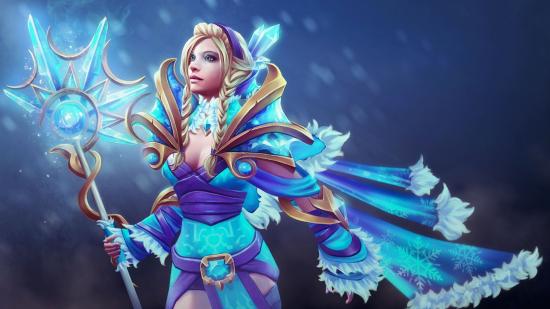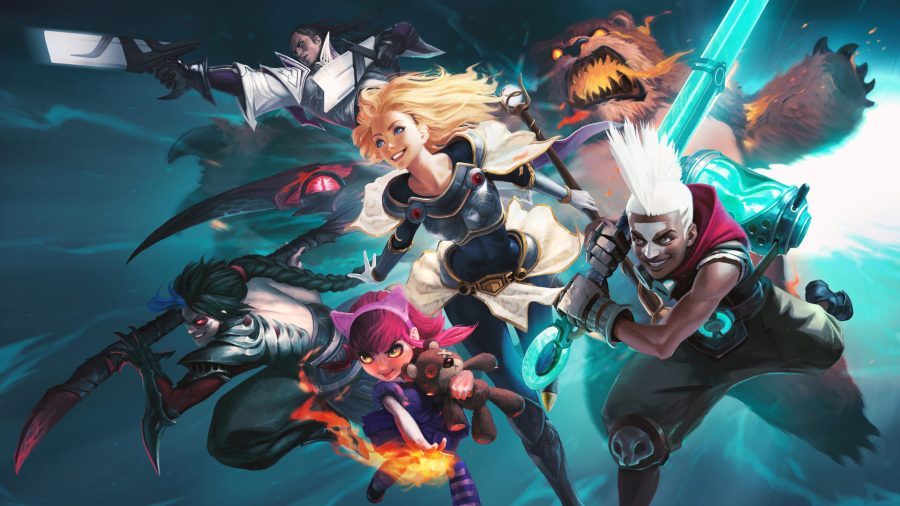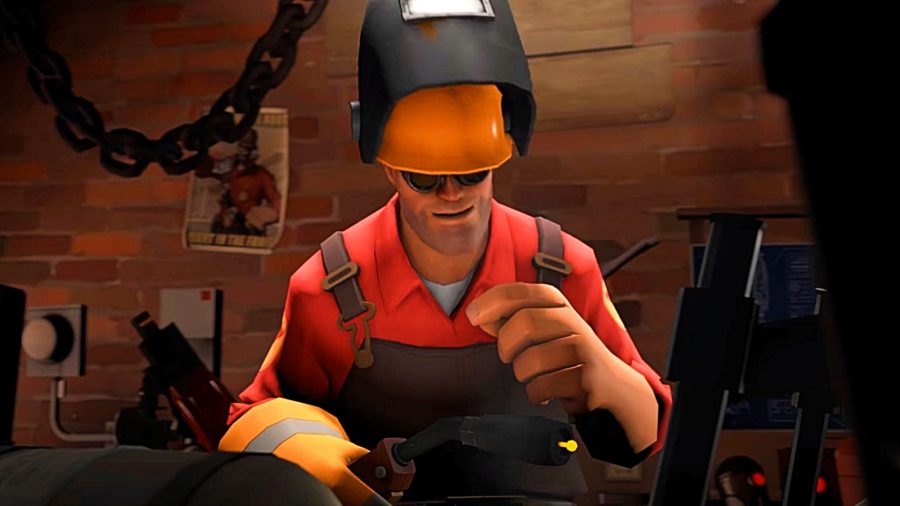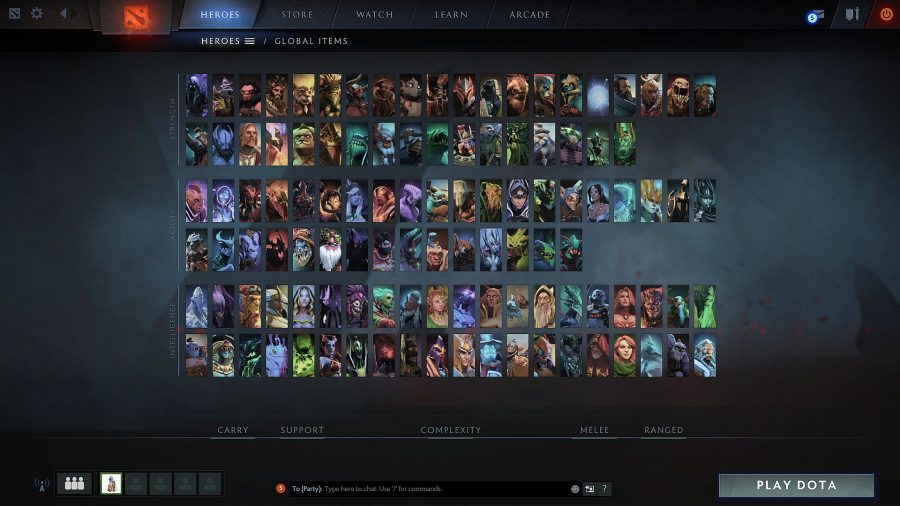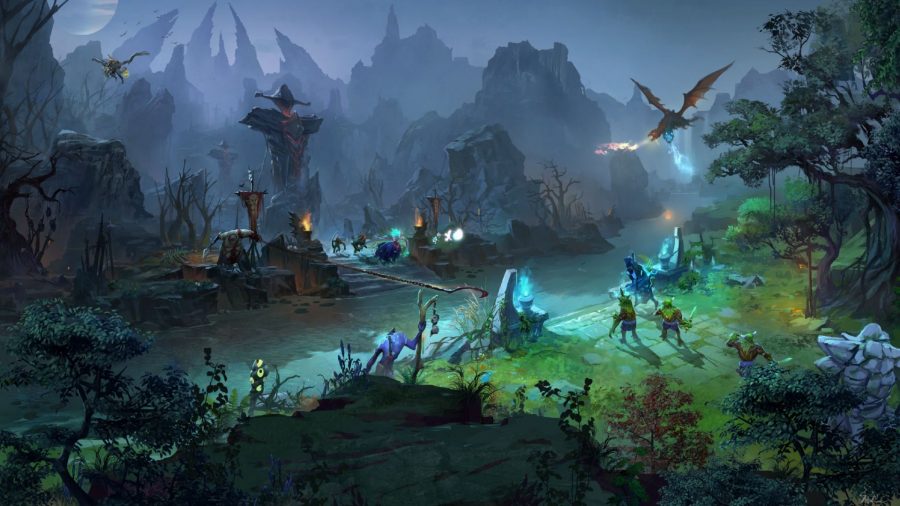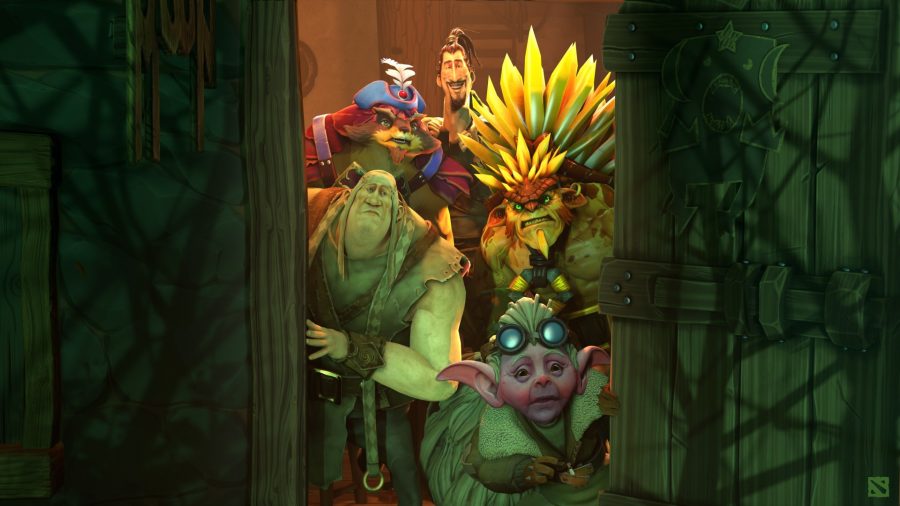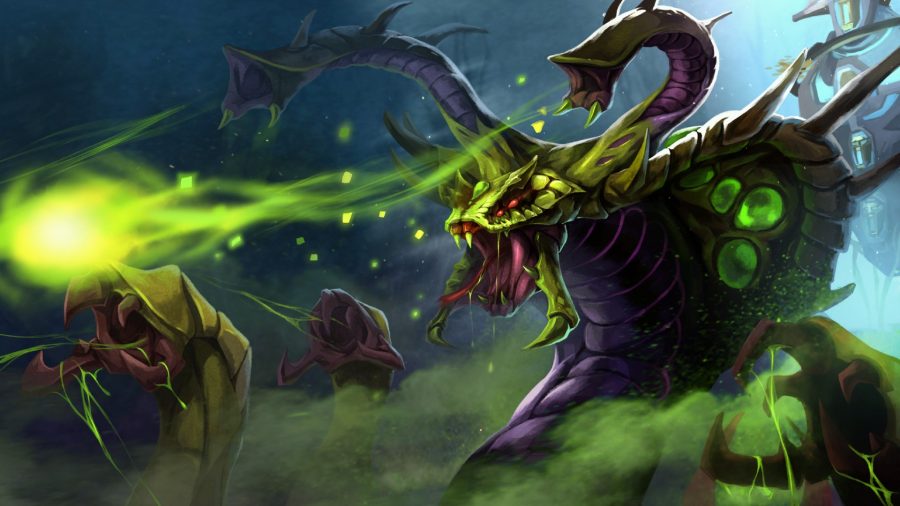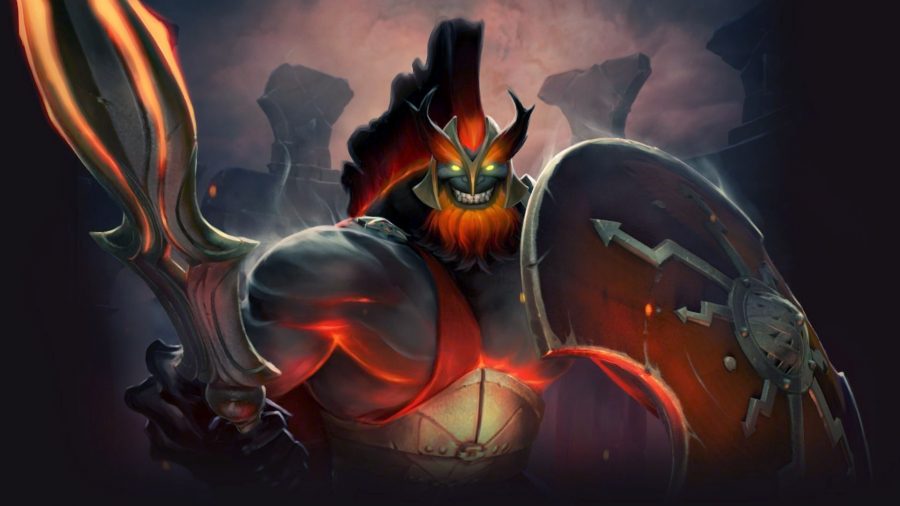Hands up if you’ve ever come across the stereotype that women typically play support. No, not – I’m not armed, I’m just trying to – ok, show of hands, that’s probably a better way to put it. I can’t actually see your hands, but I know that it’s a pervasive stereotype across all manner of gaming genres – MMOs, FPSs, MOBAs, etc.
It’s not just a stereotype. I was recently in a Dota 2 stack with a bunch of female friends and we faced a hitherto unheard-of problem – we didn’t have enough carry players. This is a pretty weird situation to be in – usually the carry is the most coveted role – but there we were, awkwardly staring at an empty safe lane as the timer ticked down.
Our mid player, Emmy, tried to whip us into shape using the powerful motivational tool, guilt. “Why do none of you play carry!?” she yelled at us. I looked down at my little lopsided skill triangle in shame. I’ve played over 2,000 games of Dota 2, and 1,970 of them were as support. You can gas me up all you like, Emmy, but if you put me in that safe lane I’m going to miss so many last hits (Dota thing, don’t worry about it) everyone will report me, and my game will spontaneously uninstall itself and then eject my DVD drive and hit me in the shin.
After losing that particular game, it was time for a bit of introspection. There’s a lot of glory to be claimed out there on the various battlefields of multiplayer games, but many women predominantly play support classes instead of threshing the heads of our enemies, watching them fall before our might like ears of fresh corn in a combine harvester. Why?
Buckle up, my friends – it’s time to get out the statistics. There’s a paper called Stand by Your Man: An Examination of Gender Disparity in League of Legends, which was published in 2015 in the journal Games and Culture. They performed a quantitative study, with 16,821 participants, in which they tested several hypotheses – including that females play Support more than males. Their results suggested this was true – and that the difference was significant. The balance of women in support roles almost certainly varies between games, but for the sake of this journey of discovery we’ve embarked upon together, let’s presume that this broadly holds true – women are more likely to pick support than men are.
Now, the support role is noble and worthy, of course. It’s not as flashy as carry, DPS, or entry fragger, but it’s by no means easy, and it’s a crucial component of every successful team. So if an individual prefers the playstyle of the support role and picks it over and over again, that’s great (uh, unless you’re trying to win a Dota game with four other people with the same preferences).
Related: Our pick of the best Dota 2 heroes for beginners
But I don’t think that’s the only factor at play here. Do I pick support in Dota every day because I ‘prefer the playstyle of the support role’? Not sure about that one. I play melee DPS in every MMO I try; when I played TF2 as a kid, you’d find me playing Pyro or Sniper – very rarely Medic. I do pick a healer occasionally in multiplayer FPS games – primarily when I’m playing with a higher-skilled friend, and/or the team is completely bereft of supports.
In Dota, I pick support because I’m better at it – probably something to do with the thousands more support games I’ve played. I don’t like the team’s chance of success being dependent on how well I can farm, use my abilities, and itemise on a hero I’ve probably never played before, because I’m uncomfortable conspicuously sucking. I’m one of the less experienced, lower MMR (rank, Elo, etc) Dota players in my group, so if I’m playing in a party with friends, the skill distribution means I’m going to be facing a player who could very well have twice my MMR – a situation I’m used to as support, but one that all but guarantees me A Bad Time if I’m trying to play carry for the fifth time in my life.
It makes sense to put the less experienced players on support. This is not necessarily because carry requires more skill than support, but it’s a role better suited to making use of the higher-skilled individual. Conversely, support is a role better suited to mitigating the disadvantage of having a significantly less experienced player on your team.
When I played my first games of Dota, the poor souls who were trying to teach me the game told me to pick Crystal Maiden – a support hero who passively provides a mana aura to allies – so that even as I was wandering around in a haze of confusion, I was still imparting some benefit to them. Thousands of games later, I’m still much worse than them – I’m more useful than providing a passive buff, happily, but they still have significantly more experience.
The fact is, I’ll never be better than the people I play with if I only ever play with them. The skill gap may close as I acquire the same game knowledge they have, but mechanically, they will always have the advantage in terms of sheer hours played. So, by my reckoning, I’ll always be playing support for them, as long as we play together.
Being introduced to your main competitive game by more experienced friends was a relatively common occurrence among the women I’ve discussed this issue with. That League of Legends study also looked into the proportion of women who play the game with a male romantic partner. They found that 73% of the female players they surveyed reported playing with a romantic partner “at least rarely”, and that female players who play with a romantic partner play support more than those who don’t.
According to the paper, the male romantic partner is also more likely to be higher skill. Interestingly, when the statistics were adjusted for hours played, this gender skill gap disappeared. In their words, “the difference in actual skill between males and females was found to be negligible for those who have played the same number of matches”. However, on average, male players had a significantly higher number of games under their belts, and were therefore more skilled.
I imagine there are many women who, like me, play support because it makes the most sense for the teams they find themselves on – teams where they’re playing with more experienced players. More women are joining the gaming community as it becomes more mainstream, and new influxes of players involve increasing numbers of women.
I’ve been playing online multiplayer games since I was 11 or 12, but that’s not the majority experience. When I learned how to play FPSs or MMOs, I played them on my own, and never felt like I ought to play support. When I started Dota 2, though, my peers had been playing RTS games for years already. I was at a substantial skill disadvantage, which put me firmly in the support seat. To begin with. But I’ve stayed there, and haven’t branched out.
So why haven’t I diversified the role I choose to play? Well, what’s the incentive to? If you’re playing with friends of higher skill – which, the study suggests, women are more likely to be doing – the incentives for branching out are few and far between. Because of the stereotype that women play support, it’s also pretty easy to settle into playing it regularly. People assume I won’t be playing carry; I’m never called upon to do it. It’s fun to experiment now and again, but when I’m working hard to contribute positively to games far above my skill level, the last thing I want to do is undo years of practice and play a role I feel woefully ill prepared for.
But I know that playing carry will make you a better support, and it’s far more useful if you want to climb the ranks in solo queue. I play casually, but I do want to improve. I don’t want to be restricted to support – though I realise I’m the one restricting myself. My main excuse is reluctance to ruin the games I play with my friends; I practice carry in matches against bots, unwilling to even play carry in solo queue, despite the fact that I know there must be carry players out there who are worse than me.
I play enough with high-skill players that I’m constantly aware of how bad I am in comparison, so I assume there’s no way I could outplay anyone, but the mere existence of players beneath my skill bracket suggests that is not the case. Thinking about it, always being the least-skilled player on my team has certainly had an effect on my mentality. I notice and appreciate the things my teammates do that I haven’t mastered yet. I typically assume everyone else is better than me, though I probably overestimate the skill gap between myself and the other players on my team. Yeah, I’m no pro, but I’m not so bad that playing mid is going to cause my teammates to bleed from their eyes.
Why am I so reluctant to suck? It should be expected while learning something new. However, there’s a commonly voiced concern among women I speak to about being really self conscious about having a bad game, because there’s this awful burden about conspicuously doing badly as a woman, and representing all of womankind in a bad light. I know I personally feel like I set feminism back by five years every time I screw up and die.
If I’m dealing with low self-confidence – and trying to branch out and play games on my own – I really don’t want grief from random teammates, so I never speak on mic, even when I want to make calls and share helpful information. Speaking over mic as a woman is not fun. When the women I play with use voice comms, nine times out of ten there is an immediate change in attitude among our teammates – usually someone says something sexist or creepy, or starts acting up in some bizarre way.
Toxic behaviour is incredibly common in online multiplayer games, affecting women and men alike. Alike, but not equally – unfortunately, studies have shown that a female voice is far more likely to elicit negative responses than a male voice. A paper titled Communication in multiplayer gaming: Examining player responses to gender cues, published in 2012 by Kuznekoff and Rose, found that “on average, the female voice received three times as many negative comments as the male voice or no voice. In addition, the female voice received more queries and more messages from other gamers than the male voice or no voice.”
That’s pretty damn exhausting. As a response to this torrent of weird attention, women often attempt to mask their gender by choosing gender-neutral screen names and avoiding voice chat (Fox and Tang, 2016). Of course, this results in women being less visible overall, and contributes to their perception as a significant minority in gaming.
Which brings me to an important point. People’s impressions of the female players in their games – including the stereotype that women only play support – are based upon the information they’re able to gather from the women they actually meet in-game. I’ve probably encountered loads of women in my Dota games, but I had no way of knowing they were women – similarly, they won’t have known anything about my gender, either.
A lot of us are hiding. Meeting a woman who breaks both the stereotype of playing support and speaks on mic is doubly rare, so no wonder it barely ever happens. Creating a better environment for women to speak on mic is a goal we should all strive toward; and I can probably do my part by, uh, pressing that push-to-talk button once in a while, scary as it may seem. Obviously, everyone else needs to do their part by being respectful of those who do speak up.
A 2019 study by the ADL shed light on just how many players avoid or quit games because of in-game harassment, and Dota 2 was right at the top of the list. It’s the game with the highest proportion of players who experience harassment, and with the highest proportion of players who have become more careful playing or stopped playing as a result of harassment. That’s not good for those of us who love the game and want the best for it. There’s a lot more work to be done when it comes to making our favourite games a less toxic and more inclusive space.
So, after examining why women in multiplayer games often favour the support role, the harm this stereotype does still needs to be examined. The idea that female gamers are in their own separate box, outside of the ‘mainstream’, is unhelpful and restrictive to women. Additionally, the idea that women need to diversify and play carry roles to be ‘real gamers’ is pretty insulting, too.
All I can really offer is perspective on my own individual situation. So if I were prescribing myself advice, I’d say: go play carry by yourself. Lose horribly for a bit, try not to take it to heart, work on correcting your mistakes – and next time you end up on an all-female stack, you’ll say “I shall carry thee, my friends”, and then… glhf.
